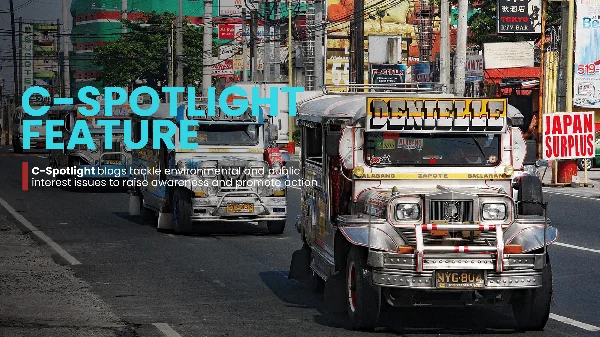The Road to Ruin? PTMP’s Fossil Fuel Drive and the Climate Consequences
By: C-Help Team

Image by gloverbh222 from Pixabay
These rainy days hit differently. As floods rise and classes get suspended again, I cannot help but think about how climate change is worsening our monsoon — and how it’s all tied to our dependence on fossil fuels. So while I glance out the window with my work from home setup
and see cars, buses, and jeepneys braving the flooded streets, I am reminded of our PUVMP case — a petition for certiorari and prohibition filed by transport groups and commuters against the Department of Transportation (DOTr) and the Land Transportation Franchising and Regulatory Board (LTFRB). The petition challenges the constitutionality of the Public Utility Vehicle Modernization Program (PUVMP) [now Public Transport Modernization Program (PTMP)], arguing that its provisions violate the rights to due process, property, and freedom of association.
Launched in 2017, the PUVMP is a comprehensive reform program of the DOTr that aims to overhaul the public transport system by mandating that jeepneys 15 years or older be replaced with those that have Euro 4 or electric engines and modern amenities such as GPS, automated fare collection systems, and CCTV cameras.
https://sc.judiciary.gov.ph/g-r-no-267755-270750-dlhb-transport-service-corp-dlhb-team-uv-express-transport-service-coop-team-uv-amcl-uv-express-federation-amcl-freeport-area-of-bataan-jeepney-operators-and-driver/
PUVMP: Public Utility Vehicle Modernization Program Philippines
At first glance, the program is ideal; it is a win for commuters, drivers, and the planet. But on the ground, it's a different story. The petitioners in the case mentioned above stated that the program unfairly burdens small-scale operators and favors larger corporations. Furthermore, it fails to implement a "just transition", as required by law, which states that climate action must be consistent with human rights and that those who have contributed the least to climate change should be the primary beneficiaries of the climate action.
The program is financially inaccessible and socially inequitable. The cost of the new vehicles is high and cannot simply be afforded by small operators, even with loan programs. This led to a great loss of income on the part of the drivers and operators as they are essentially priced out of the program. Aside from this, the deadline for the phase out of traditional jeepneys has placed them under a ton of strain as well as the looming threat of non-renewal of franchise.
What’s more is that these small operators and drivers are also forced to consolidate and undergo route rationalization. The traditional jeepneys and modern jeepneys are now faced with overlapping routes, which causes competition amongst the drivers of the said jeepneys.
In addition, because of a lack of inclusive planning and genuine consultation, these small operators and drivers could only decry their opposition to the program through protests and strikes. What was meant to be a green solution has become, for many, a heavy burden. All in all, these modernization efforts disproportionately shift the weight onto those least equipped to bear it hence why the petitioners sought recourse with the Supreme Court through a petition.
Public transportation, which remains the backbone of mobility for millions of Filipinos, is largely powered by diesel, one of the dirtiest fossil fuels. With global market volatility and regional conflicts impacting oil prices, the cost of transport has become increasingly unstable, driving inflation and squeezing the daily budgets of both commuters and transport workers.
The climate impact is just as severe. According to the World Bank, the Philippines’ transport sector alone accounts for 13% of its total GHG emissions, making it one of the top contributors to climate change in the country. 4 Emissions from land transport are projected to quadruple by 2050, rising from 25 million tons of CO₂ equivalent in 2020 to 147 million tons if current motorization trends continue. 5 In 2020, the transport sector accounted for 22.8% of the Philippines’ greenhouse gas emissions, covering road, air, water, and rail transport 6 exacerbating environmental degradation and putting vulnerable communities at greater risk from typhoons, floods, and heatwaves.
https://blogs.worldbank.org/en/transport/fight-against-covid-19-public-transport-should-be-hero-not-
villain
CEDTyClea. (2023, November 5). Greenhouse gas emissions from PHL land transport to quadruple by
2050. BusinessWorld Online. https://www.bworldonline.com/top-stories/2023/11/06/555501/greenhouse-
gas-emissions-from-phl-land-transport-to-quadruple-by-2050/#google_vignette
Id.
It's a vicious cycle: the more we rely on fossil fuels, the more we suffer the effects of the climate crisis they fuel. To break this vicious cycle, we must reimagine public transport not just as cleaner, but as fairer. That means centering the voices of the most affected - drivers, operators, and commuters - and ensuring that climate solutions uplift rather than displace. Fossil fuel dependence has made our monsoons more violent and our streets more vulnerable. If we want to mitigate the worsening effects of monsoons, we need a transport system that’s not only modern, but also equitable, resilient and truly transformative. Let the floods be a wake-up call, not just to upgrade our vehicles, but to overhaul the values that
drive our policies.
